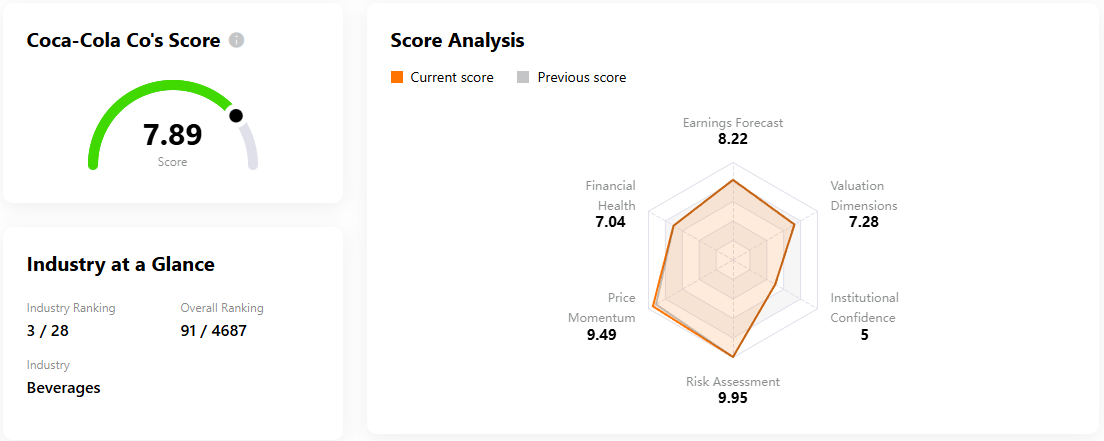Coca-Cola Beats Q3 Revenue Estimates Despite Price Hikes, with Zero-Sugar Products Driving Growth
TradingKey - On Tuesday, Coca-Cola Company reported robust third-quarter financial results, with global sales and profits both exceeding Wall Street expectations. Despite ongoing price increases and slightly weakened consumer demand in certain regions, the company successfully stimulated market demand through innovation in its zero-sugar product line and effective implementation of its small-pack strategy.
The report showed third-quarter revenue increased 5% year-over-year to $12.5 billion, surpassing analysts' expectations of $12.41 billion, with organic revenue (excluding currency fluctuations, acquisitions, and other non-core business impacts) growing 6%; adjusted earnings per share reached 82 cents, exceeding market estimates of 78 cents.
Notably, the company's quarterly "price mix" (average selling price across different products) rose 6%, a figure higher than analysts' average expectations. "Coca-Cola continues to show pricing power, successfully passing higher costs through to consumers," said Mark Vickery, senior market analyst at Zacks Investment Research.
Boosted by the positive earnings news, Coca-Cola's stock rose 4% on Tuesday, closing at $71.22. The stock has gained over 15% year-to-date. According to TradingKey Stock Score tool, Coca-Cola received a score of 7.89, ranking third among 28 beverage industry stocks. The tool also shows that Wall Street analysts have set a target average price of $76.578, indicating approximately 11.89% potential upside from the current price.

Growth Engines Behind the Strong Earnings
The company also reported that "Coca-Cola Zero Sugar" saw a robust 14% global sales increase in the third quarter, with this strong growth momentum evident across major markets.
This trend aligns with growing health consciousness among global consumers, particularly in the United States—a phenomenon that has become increasingly significant against the backdrop of rising weight-loss drug usage in the U.S. domestic market and the "Make America Healthy Again" movement promoted during former President Donald Trump's administration.
Coca-Cola has successfully captured this consumer trend through its continuously expanding beverage portfolio, including various sugar-free sodas, sports drinks, and bottled water, winning favor with a broader consumer base.
“There’s more and more focus on people wanting to live a healthier, more balanced lifestyle and Coke Zero, Diet Coke, etc. fits more into that equation,” Chief Financial Officer John Murphy said in an interview Tuesday morning.
“We expect health-focused innovation to remain a priority, with Coke doubling down on zero-sugar recipes and functional benefits including protein and fiber,” Dan Su, chartered financial analyst for Morningstar, wrote in an analysis of the company today. “After the success of Coke Zero Sugar (global volume up 14%), it is poised to speed up the launch of other better-for-you offerings.”
Meanwhile, Henrique Braun, Coke’s chief operating officer, said the company has focused on affordability by shrinking package sizes and leaning into sales of mini cans. Earlier this month, Coke announced it will sell individual, 7.5-ounce mini cans for the first time at North American convenience stores starting Jan. 1. The mini cans have a suggested retail price of $1.29.
Competitive Pressures and Bottling Business Restructuring
However, the company is not without challenges, with sales in the Asia-Pacific region declining approximately 1% in the third quarter, primarily due to intensified local competition in markets like India and China.
CEO James Quincey stated during the conference call that the company is shifting toward more localized strategies to address competitive pressures, which involves not only pricing factors but also market adaptability adjustments.
To further optimize its business structure, Coca-Cola announced earlier Tuesday an agreement with South African private equity firm Gutsche Family Investments to sell 75% controlling stake in Coca-Cola Beverages Africa to Swiss bottler Coca-Cola HBC AG for $2.55 billion, expected to be completed by the end of 2026.
Coca-Cola will retain a 25% stake and described this move as the final step in the bottling franchise restructuring plan initiated a decade ago, with similar transactions already implemented in India.
Quincey stated that this strategy helps Coca-Cola focus more on brand building and innovation, while bottling companies can invest in manufacturing systems. “The bottler performs better and it helps us drive overall growth for the total system, so that the combination grows faster and is more profitable."






